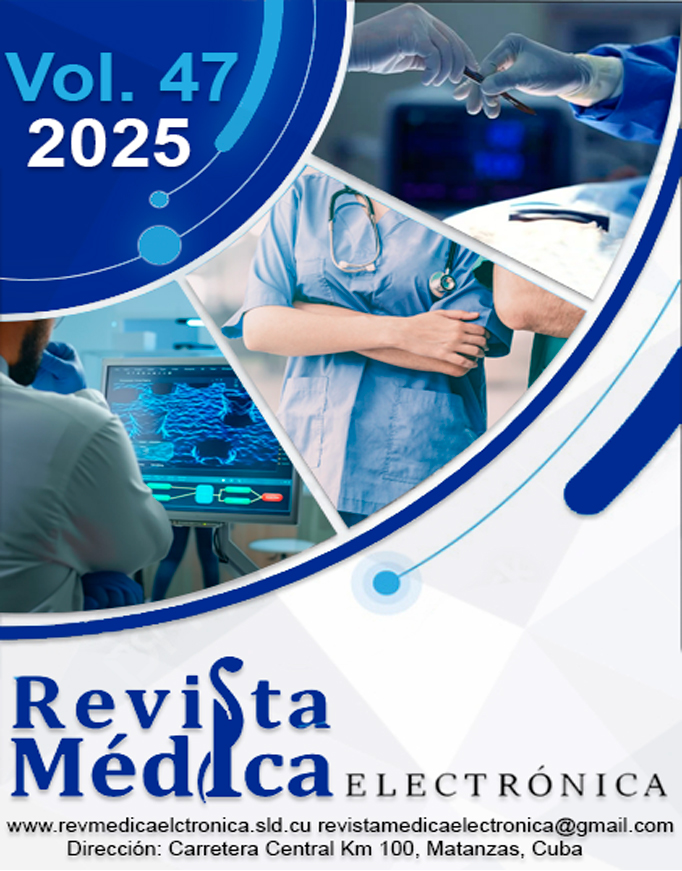Cardiovascular morphological alterations in experimental biomodel of arterial hypertension
Keywords:
hypertension, ischemia, morphologyAbstract
Introduction: Arterial hypertension is a chronic disease characterized by the continuous increase of blood pressure figures in the arteries; it produces structural changes in various organs, one of which is the heart, with serious clinical repercussions on the cardiovascular system.
Objective: To detect morphological alterations at the cardiac level in experimental arterial hypertension.
Methods: A morphological study was performed in an experimental biomodel, which was achieved after supplying 10% saline solution for 15 days in 10 male Wistar rats. Subsequently, they were necropsied with macro and microscopic examination of the heart. Histological sections (4µ) were processed by the paraffin method. Hematoxylin/eosin staining techniques were used, and the histological study was performed under an optical microscope.
Results: Hypertrophic myocardial alterations were observed, in addition to vascular lesions by arteriosclerosis and secondary lesions due to ischemia.
Conclusions: The observed alterations explain clinical and pathophysiological aspects that also occur in the same way in humans, establishing a logical anatomical and clinical correlation, which contributed to the development of knowledge and research of arterial hypertension, with a view to future experimental therapeutic studies.
Downloads
References
1. Martínez-Santander Carlos J, Guillen-Vanegas Maritza, Quintana-Cruz Dana M, Cajilema-Criollo Xavier. Prevalencia, factores de riesgo y clínica asociada a la hipertensión arterial en adultos mayores en América Latina. Dom Cien [Internet]. 2021 [citado 30/09/2024];7(4):2190-216. Disponible en: https://dialnet.unirioja.es/descarga/articulo/8383987.pdf
2. Londoño Agudelo E, Battaglioli T, Díaz Piñera A, et al. Effectiveness of a provider and patient-focused intervention to improve hypertension management and control in the primary health care setting in Cuba: a controlled before-after study. BMC Prim Care [Internet]. 2023 [citado 30/09/2024];24(1):10. Disponible en: https://pubmed.ncbi.nlm.nih.gov/36641434/
3. Piloni-Martini J, Quintero Lira A, Urrutia Hernández TA, et al. Inducción y evaluación del síndrome metabólico en modelo animal: revisión bibliográfica. Bol Cienc Agropecu ICAP [Internet]. 2024 [citado 05/01/2025];10(19):22-6. Disponible en: https://repository.uaeh.edu.mx/revistas/index.php/icap/article/view/8949
4. Gorostidi M, Santamaría Olomo R, Oliveras A, et al. Hipertensión arterial esencial [Internet]. Madrid: Nefrología al Día; 2020 [citado 30/09/2024]. Disponible en: https://www.nefrologiaaldia.org/es-articulo-hipertension-arterial-esencial-302
5. Sievers LK, Eckardt KU. Molecular Mechanisms of Kidney Injury and Repair in Arterial Hypertension. Int J Mol Sci [Internet]. 2019 [citado 30/09/2024];20(9):2138. Disponible en: https://pmc.ncbi.nlm.nih.gov/articles/PMC6539752/pdf/ijms-20-02138
6. Magnussen C, Ojeda FM, Leong DP, et al. Global Effect of Modifiable Risk Factors on Cardiovascular Disease and Mortality. N Engl J Med. 2023;389(14):1273-85. DOI: 10.1056/NEJMoa2206916.
7. Liskova S, Cacanyiova S, Cebova M, et al. Taxifolin Reduces Blood Pressure via Improvement of Vascular Function and Mitigating the Vascular Inflammatory Response in Spontaneously Hypertensive Rats. Int J Mol Sci [Internet]. 2023 [citado 30/09/2024]:24(16):12616. Disponible en: https://pubmed.ncbi.nlm.nih.gov/37628795/
8. Torres Pérez RF, Quinteros León MS, Pérez Rodríguez MR, et al. Factores de riesgo de la hipertensión arterial esencial y el riesgo cardiovascular. Rev Latinoam Hipertens [Internet]. 2021 [citado 07/02/2023];16(4):321-8. Disponible en: https://www.revhipertension.com/rlh_4_2021/9_factores_riesgo_hipertensio_arterial.pdf
9. Moctezuma Viera KR, Linares Márquez P. Utilización de animales en la investigación biomédica y médica. Rev iberoam bioét [Internet]. 2020 [citado 30/09/2024]:(12):1-19. Disponible en: https://revistas.comillas.edu/index.php/bioetica-revista-iberoamericana/article/view/11780
10. Demirel MA, Şumlu E, Özercan İH, et al. Impact of high-fructose diet and metformin on histomorphological and molecular parameters of reproductive organs and vaginal microbiota of female rat. Sci Rep. 2024;14:27463. DOI: 10.1038/s41598-024-76211-5.
11. Mitchell R, Halushka M. El corazón. Patología estructural y funcional. 10 ed. Barcelona: Elsevier España; 2021. p. 527-83.
12. Jordan AN, Anning C, Wilkes L, et al. Rapid treatment of moderate to severe hypertension using a novel protocol in a single-centre, before and after interventional study. J Hum Hypertens [Internet]. 2020 [citado 30/09/2024];34(2):165-75. Disponible en: https://pubmed.ncbi.nlm.nih.gov/31645638/
13. Hunanyan AS, Verma A, Bidzimou MT, et al. Progressive central cardiorespiratory rate downregulation and intensifying epilepsy lead to sudden unexpected death in epilepsy in mouse model of the most common human ATP1A3 mutation. Epilepsia. 2025;66(3):899-913. DOI: 10.1111/epi.18236.
14. Golafshan F, Shafieyoon M. Hypertension and chronic kidney disease; a mutual relationship. J Renal Inj Prev. 2024;13(3):e32277. DOI: 10.34172/jrip.2024.32277.
15. Romero Borges R. Biomodelos de hipertensión en ratas WISTAR. Invest Medicoquir [Internet]. 2024 [citado 30/09/2024];15. Disponible en: https://revcimeq.sld.cu/index.php/imq/article/view/852
16. Bakris GL. Hipertensión. Manual MSD. Versión para profesionales [Internet]. New Jersey: Merck & Co., Inc; 2022 [citado 30/09/2024]. Disponible en: https://www.msdmanuals.com/es/professional/trastornos-cardiovasculares/hipertensi%C3%B3n/f%C3%A1rmacos-para-la-hipertensi%C3%B3n-arterial
17. Firus Khan AY, Ramli AS, Abdul Razak S, et al. The Malaysian HEalth and WellBeing AssessmenT (MyHEBAT) study protocol: an initiation of a National Registry for Extended Cardiovascular Risk evaluation in the community. Int J Environ Res Public Health [Internet]. 2022 [citado 30/09/2024];19(18):11789. Disponible en: https://pubmed.ncbi.nlm.nih.gov/36142062/
18. Tukhovskaya EA, Slashcheva GA, Shaykhutdinova ER, et al. Taxifolin Reduces Blood Pressure in Elderly Hypertensive Male Wistar Rats. Bull Exp Biol Med [Internet]. 2022 [citado 30/09/2024];174(1):29-32. Disponible en: https://pubmed.ncbi.nlm.nih.gov/36437314/
19. Ichimura S, Misaka T, Ogawara R, et al. Neutrophil Extracellular Traps in Myocardial Tissue Drive Cardiac Dysfunction and Adverse Outcomes in Patients With Heart Failure With Dilated Cardiomyopathy. Circ Heart Fail [Internet]. 2024 [citado 30/09/2024];17(6):e011057. Disponible en: https://pubmed.ncbi.nlm.nih.gov/38847093/
Downloads
Published
How to Cite
Issue
Section
License
Copyright (c) 2025 María Luisa García-Gómez, Ramón Romero-Borges, Tania Llerena-Bernal

This work is licensed under a Creative Commons Attribution-NonCommercial 4.0 International License.
All content published in this journal is Open Access, distributed under the terms of the CC BY-NC 4.0 License.
It allows:
- Copy and redistribute published material in any medium or format.
- Adapt the content.
This will be done under the following terms:
- Attribute the authors' credits and indicate whether changes were made, in which case it must be in a reasonable way.
- Non-commercial use.
- Recognize the journal where it is published.
The copyrights of each article are maintained, without restrictions.






